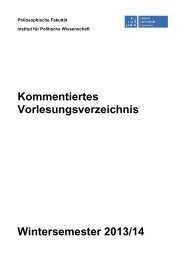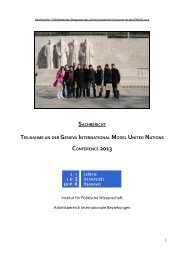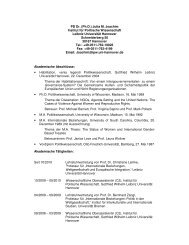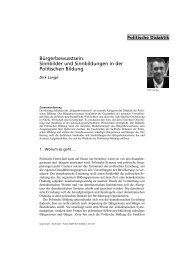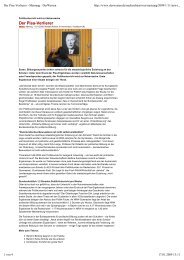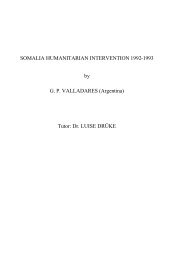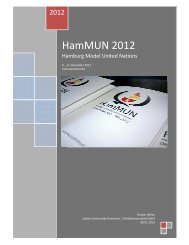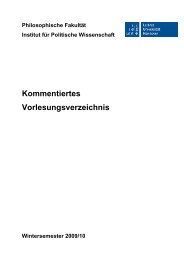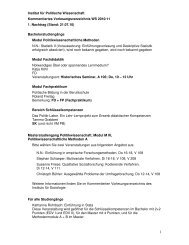Preventive Action for Refugee Producing Situations
Preventive Action for Refugee Producing Situations
Preventive Action for Refugee Producing Situations
Create successful ePaper yourself
Turn your PDF publications into a flip-book with our unique Google optimized e-Paper software.
190 Chapter 4<br />
In the midst of the humanitarian nightmare in <strong>for</strong>mer Yugoslavia with<br />
almost 3 million people - refugees, displaced persons and people trapped in the<br />
besieged cities and regions, innocent civilians continue to be victims of terror<br />
and deadly reprisals. The High Commissioner convened on 29 July 1992 an<br />
international ministerial meeting with an objective to obtain support <strong>for</strong><br />
concepts to deal with the crisis and <strong>for</strong> the necessary funding. The summary of<br />
the president states a general endorsement of the High Commissioner's<br />
suggestion <strong>for</strong> a comprehensive approach evolving around seven key-elements,<br />
including preventive protection to reduce the factors which lead to<br />
displacement. 433 In her message to the meeting of the Humanitarian Issues<br />
Working Group of the London Conference, the High Commissioner urged <strong>for</strong><br />
strengthening protection in the region both preventive and temporary. 434 At the<br />
same time, the High Commissioner insisted that the basic principle of nonrefoulement<br />
cannot be compromised. 435<br />
UNHCR's presence in refugees' countries of origin is in principle always of<br />
crucial importance to any prevention and solution-oriented activities. 436<br />
<strong>Preventive</strong> protection inside countries of origin is increasingly extended so<br />
that people do not feel compelled to cross borders in search of<br />
protection. 437<br />
the background, once a situation became so grave as to be considered a threat to<br />
international peace and security and thus a matter <strong>for</strong> the political organs of the<br />
United Nations: the Secretary-General and - notably - the Security Council. In the<br />
major political confrontations the High Commissioner ought not to be involved;<br />
then better a Special Representative or some similar agent or agency, who could<br />
take the brunt without jeopardizing the ongoing, humanitarian work," p.245.<br />
433 HCR/IMFY/1992/4,10 August 1992, p. 6.<br />
434 Statement by Mrs. Sadako Ogata United Nations High Commissioner <strong>for</strong><br />
<strong>Refugee</strong>s and Chairperson of the Humanitarian Issues Working Group of the<br />
International Conference on <strong>for</strong>mer Yugoslavia (Geneva, 9 October 1992).<br />
435 Ibid., p. 2.<br />
436 See A/AC.96/799,25 August 1992, p. 8<br />
437 Ibid., p. 9.<br />
Chapter 5<br />
Legal Justification<br />
5.1. Objections of states against international preventive actions<br />
As this is a thesis in political science and not in international law, this<br />
chapter is limited to a brief summary of possible legal arguments of states<br />
against the proposed international preventive actions, and rebuttals to those<br />
objections. It will not attempt to provide an exhaustive account of<br />
international law on the subject.<br />
The main reason that international and nongovernmental organizations<br />
have limited their involvement in preventive work is that states tend to<br />
perceive early warning and prevention activities as intrusions into their<br />
internal affairs. The rationale that states often use to resist plans <strong>for</strong> preventive<br />
action is that it may interfere with their own national security and<br />
other domestic matters. We will make it quite clear that our proposed actions<br />
are not intended to infringe on national sovereignty. On the contrary, we<br />
hope that with international assistance, the weaker countries and their people<br />
will be less vulnerable to intervention by larger powers.<br />
5.1.1. National security<br />
Both national 438 and international Iegislation439 <strong>for</strong> the protection of human<br />
rights and refugees contain restrictions on the grounds of national<br />
_________________________<br />
438 Art. 11(2) of the Aliens Law 1965 (Ausländergesetz) of the Federal Republic<br />
of Germany <strong>for</strong>esees: "Ausländer, die als politisch Verfolgte Asylrecht<br />
genießen, heimatlose Ausländer oder ausländische Flüchtlinge können, wenn<br />
sie [sich] rechtsgemäß im Geltungsbereich dieses Gesetzes aufhalten nur aus<br />
schwerwiegenden Gründen der öffentlichen Sicherheit und Ordnung<br />
ausgewiesen werden." See Goodwin-Gill, The <strong>Refugee</strong> in International Law,<br />
London: Ox<strong>for</strong>d University Press, 1983, p. 82.<br />
439 Art. 3 of the Declaration on Territorial Asylum, adopted by the General<br />
Assembly in 1967, does not only acknowledge the national security exception,<br />
but also appears to authorize further exceptions in order to safeguard the<br />
population, as in the case of a mass influx of persons. Goodwin-Gill, The<br />
<strong>Refugee</strong> in International Law, pp. 96-97. The Committee of Ministers of the<br />
Council of Europe, in a resolution of 1967, recognized 'the necessity of<br />
safeguarding national security nd of protecting



